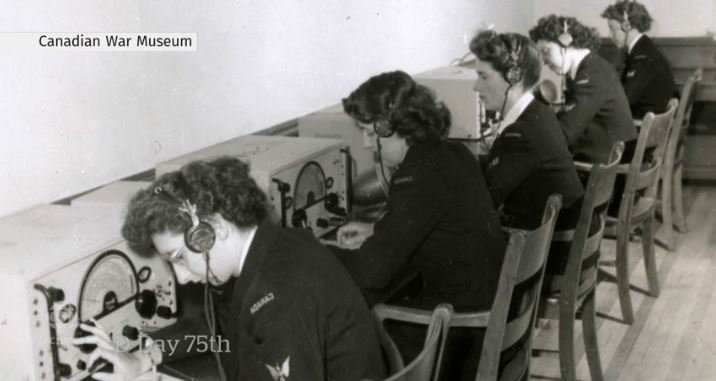Many thanks to SWLing Post contributor, Fred Waterer, who shares the following fascinating video from the CBC and notes:
“The Listeners” Members of the Women’s Royal Canadian Naval Corps monitored the airwaves for German U-Boat traffic. Their participation was secret for decades.”
Click here to view this video via the CBC.
This is such an amazing story, Fred, and the CBC did a fine job putting it together. Thanks so much for sharing.
Editor’s note regarding WWII history: Regular SWLing Post readers know that I’m an avid WWII history buff, in that I read, view, and especially listen to many accounts of the Second World War era, the glory days of radio. I’ve traveled and lived in several of the countries that were, at that time, among the Axis Powers, some of my close friends are from or reside in these countries now, and feel much as I do about this history: that this was a devastating war which we must not forget or romanticize, and from which we can learn about ourselves as human beings, hopefully with the view of preventing such chilling events from ever being repeated. As we have readers and contributors from all over the world in this radio community, I sincerely hope that WWII-related articles are regarded in this light of understanding. The takeaway? Times have changed. I firmly believe that a deep understanding of our shared history makes us all better people.


My mother, Eileen Dingwall (nee Carr) is the woman on the left in the photo of the listeners. I’d never seen that photo before. She’s now 99 and slipping away, but always said the smartest thing she ever did was join the WRENS. At the end of the war they discharged the women but she was called back as a civilian and served until she married in 1951. Fast forward to 2002 and I’m on a ship on the Amazon River in Brazil. My German boss asked me what my parents did for a living. I told him and he got very quiet. Turned out his father was an uboat captain off the east coast of Canada/USA and my mother was trying to get him killed. Funny world, eh?
Hello Annie,
Thanks for sharing this! So sorry to hear about your mother not being well! At least the “best agers” among us have parents or grandparents who either fought in the war or were affected by it when they were kids, and their stories are very alive in us who were born after the war. That background makes us (or it should make us) appreciate all the more that we are not forced to go through anything like that and that’s the very point of your mother’s service in WWII. It’s so great that we can see the photos and hear the stories on an international basis!
“As we have readers and contributors from all over the world in this radio community, I sincerely hope that WWII-related articles are regarded in this light of understanding. ”
I hope you didn’t feel like writing this because someone complained. Anyway, I think there is no valid reason for “don’t mention the war” https://www.youtube.com/watch?v=yfl6Lu3xQW0 sentiments, in particular when it comes to radio in the war. 🙂
What I like most about the SWLing Post is that it’s really an “all things radio” outlet for news, stories and information, despite the name. This is exactly what “radio” means to me – a big world between ELF and EHF, Radio Caroline and radio astronomy, between casual listening and ambitious, sleep depriving DX hunting, commonplace and mystery signals, between extremes of all flavors – and history is what’s connecting all those with each other. I’m pretty sure most (if not all) Post readers understand what I mean by that. If you will, radio is living history I can hear and feel, that is world history and my very own history, and that’s making radio all the more exiting for me.
WWII is an extraordinarily important and interesting part of (of course not only) radio history, where so many firsts took place that are still very meaningful for us today. To begin with, radio was (ab)used to set the world ablaze in first place and it helped tremendously to put out the fires, it was the first electronic medium to demonstrate the power, the potential and the risks of all electronic media to follow, including the internet. Many people don’t realize how many tangible and intangible things that surround, govern or move us today are echoes of WWII.
I welcome every tidbit of new information about it, and I am grateful that we can mention the war and discuss it as friends. Too many innocent people, kids and families on all sides paid an inconceivably high price for that freedom, and we are obliged to honor that by making the best of it, forever, no matter how hard some politicians may try to rock the boat.
That is the classic Fawlty Towers clip! 🙂 No one has ever complained, actually, about my numerous WWII and radio history posts. I’m so glad the SWLing Post resonates with you and other readers so well. Your comment made my day, OM!
-Thomas
Thank you. A great story.